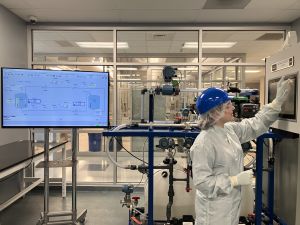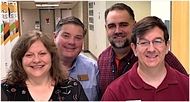Ryan Bradshaw feels fortunate that Mentor-Connect’s expanded mission provides mentoring to community college educators who are new to the Advanced Technological Education (ATE) program, even if their colleges have had recent ATE grants.
Johnston Community College, where Bradshaw is chair of Business Education & Technology Department, has had two ATE grants since 2018. But Bradshaw was not part of those projects that were developed with Mentor-Connect mentoring, nor had he worked on grants at other community colleges previously.

In September—months before he would learn reviewers’ ratings of JCC’s cybersecurity project proposal, Bradshaw called it a success because of all that he had learned. The four-person team he led was mentored by Pam Silvers, co-principal investigator of Mentor-Connect. Bradshaw praised Silvers and also described how Mentor-Connect’s in-person workshops affirmed and inspired his work.
“For a faculty member to have the opportunity to go to a national conference, to be a part of something that will elevate their program, it creates an excitement and anticipation for the good works they do. And then when you have students come in and see the interesting, fun, and exciting things that we’re bringing to their program, it actually draws students to the programs. It gives students a reason to stick around because we’re doing interesting, exciting things. I believe once you have enthusiasm in our programming it’s contagious. It spreads from faculty to students and throughout the community. And so I’m really positive about the things we’re doing with the program and with this proposal,” he said.
To learn more about the various types of mentoring that Mentor-Connect offers, see the NSF ATE Program Opportunities & Mentor-Connect Orientation Webinar at https://www.youtube.com/watch?v=1vbpxN2PyAo
Applications for Mentor-Connect’s 2024 cohort are due Friday, November 10.
Attentive Mentoring
“There are a lot of steps, or pieces of the puzzle that go into an NSF proposal, and Pam [Silvers]—our mentor—has just been working with us to refine our proposal and make sure we have all the pieces intact,” Bradshaw said.
The JCC team met with Silvers in person at Mentor-Connect’s Winter Workshop in February in New Orleans and Mentor-Connect’s Summer Workshop in conjunction with the HI-TEC Conference in July in Atlanta. Bradshaw and other team members also interacted with Silvers periodically via Zoom, phone, and email from January through late September when their proposal was submitted to the National Science Foundation.
“Pam is the type of mentor who’s not afraid to tell you the truth. She will tell you if your approach is not good, and she actually will probe you with questions to lead you down a pathway toward the answers that she thinks you need to have,” Bradshaw said. In addition to asking challenging questions, Silvers suggested subject-matter experts that team members could talk to and offered feedback on multiple drafts as they refined their proposal.
“They’re not going to do the proposal for you, but they are going to give you every opportunity to do it right,” Bradshaw said of Mentor-Connect’s mentors.
Because of its other ATE grants, JCC’s 2023 proposal was submitted in the ATE Projects track rather than to the Small Projects for Institutions New to ATE Program track used by most of colleges whose teams participate in Mentor-Connect’s cohort mentoring.
During the past decade Mentor-Connect has helped 234 community college teams prepare competitive proposals for the Small Projects for Institutions New to the ATE Program track. Mentor-Connect is an ATE project that is a partnership between the South Carolina Advanced Technological Education Center at Florence-Darlington Technical College and the American Association of Community Colleges.
JCC's 2023 Mentor-Connect Team

Daphne T. Lewis, JCC’s grant writer and pre- and post-award grant manager, said going through Mentor-Connect’s cohort mentoring was a “a good refresher” for her and Brian Worley, associate vice president of Business, Industry, Logistics & Transportation. The fourth person on JCC’s 2023 Mentor-Connect team is David Oliver, networking technology instructor who has also not previously been involved in an ATE project. He served as the subject-matter expert while the proposal was being written; if a grant is awarded he will be the co-principal investigator and Bradshaw will be the principal investigator.
Both Lewis and Worley had roles in Johnston’s first ATE grant for the Bio Blend project, which received Mentor-Connect New to ATE Mentoring, and a second ATE grant for Bio Blend 2.0, which received Mentor-Connect Moving-Up Mentoring.
Lewis said that as a result of serving initially as co-principal investigator and then principal investigator of Bio Blend, Worley is “very supportive” of faculty pursuing ATE grants. “He’s like ‘I’d love for us to do one every year,’” she said.
Lewis says enthusiasm for ATE grants has grown at JCC since 2018 because administrators, trustees, faculty, and staff understand “the value-add that NSF provides to our students and our program, and knowing that we have a source that is very supportive of you learning while you’re working on the project.”
She describes the benefit to students this way: “The value-add we saw with the Bio Blend and the 2.0, we were able to blend two curricula [biomanufacturing and applied engineering] and provide a certificate and training that our local industry wanted, and we were able to provide some internships.” Most of the two dozen students who went through the Bio Blend program obtained jobs in biotechnology. Bio Blend 2.0, which started in 2022, is attracting interest from students on the autism spectrum who are among the underserved populations on which this project focuses.
Lewis explained that faculty leadership of ATE grants begins with the proposal development. “I can’t write these [ATE] proposals ... You have to have the subject-matter expert who knows what they’re doing in the field, and then I can help guide them about what’s requested and word-smithing,” she said.
During the joint interview Bradshaw and Lewis reported that they, Oliver, and Worley began working on the proposal in the winter, spending a couple hours a week on it. During the summer, team members spent multiple hours each day on some aspect of the proposal.
In late September when their proposal was finished ahead of the October 5 ATE submission deadline, Brashaw and Lewis seemed energized and eager to begin work on another ATE proposal. This, they explained, would be a project done in partnership with an ATE principal investigator they met through Mentor-Connect.
“Until I got to Johnston, I don’t think I ever got permission to go big,” Bradshaw said, adding that JCC’s administrators “want us to go big and then go bigger.”
Lewis agreed. “We are striving to do great things,” she said, adding that obtaining the financial support of ATE grants is part of that strategy.

 Subscribe
Subscribe


 See More ATE Impacts
See More ATE Impacts

Comments
There are no comments yet for this entry. Please Log In to post one.